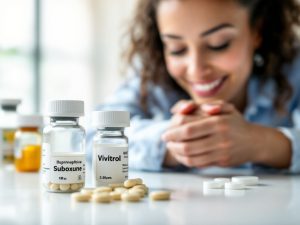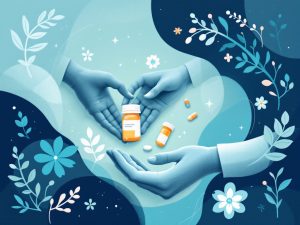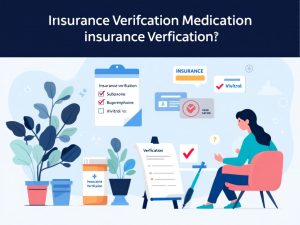Recognize opioid dependency signs
Opioid addiction can take hold quickly, exerting a powerful grip on your life or the life of someone you love. It often begins with prescription pain relievers but can also involve illicit substances like heroin or fentanyl. According to the U.S. Food and Drug Administration (FDA), over 6.1 million people aged 12 or older are estimated to have an opioid use disorder (FDA). Such widespread impact underscores the urgency of finding effective, sustainable solutions.
Opioid addiction treatment involves far more than simply addressing physical dependence. Genuine recovery addresses mental, emotional, and environmental influences that contribute to substance use. By recognizing the unique challenges individuals face, you can explore a tailored treatment program that supports long-term success.
Prevalence and risk factors
Opioid use disorder (OUD) affects people of all ages, genders, and backgrounds. Certain risk factors can elevate the likelihood of developing an opioid dependence:
- Chronic pain leading to long-term opioid prescriptions
- Genetic predisposition or a family history of addiction
- Underlying mental health conditions such as depression or anxiety
- Exposure to high-stress environments or traumatic experiences
- Past or ongoing use of other substances
Recognizing these risk factors early on can prompt you to seek evidence-based treatment programs. When this process occurs in a supportive environment, individuals often feel more confident in their ability to manage triggers and sustain recovery.
Embrace medication-assisted approaches
Medically supported interventions, also called medication-assisted treatments, can provide vital help for anyone experiencing opioid use disorder. The FDA has approved three primary medications for OUD:
- Methadone: A full mu-opioid agonist that helps suppress withdrawal symptoms and reduce cravings. Methadone is dispensed through specialized opioid treatment programs, typically requiring structured administration and ongoing counseling sessions.
- Buprenorphine: A partial opioid agonist that reduces cravings without producing the same intense euphoria as other opioids. It is commonly prescribed by qualified healthcare providers, and it can be combined with naloxone to help prevent misuse.
- Naltrexone: An opioid antagonist that blocks opioid receptors. It eliminates the pleasurable effects of opioids, minimizing cravings. Individuals must fully detox—usually for seven to ten days—before starting naltrexone.
Medication can significantly improve retention in treatment, alleviate withdrawal discomfort, and establish a more stable foundation for behavioral therapy. By integrating medication with counseling, you address both the physical dependence and the underlying emotional struggles driving opioid misuse.
Methadone, buprenorphine, and naltrexone
Choosing the appropriate medication is highly individual. Each option aims to minimize the intensity of withdrawal and cravings, but the right choice depends on factors such as:
- Medical history
- Severity of dependence
- Personal treatment preferences
- Existing obligations that may limit daily clinic visits
As you work with a professional, you can evaluate each medication’s benefits and potential obstacles. For example, methadone is typically administered in structured settings. Buprenorphine can be prescribed more flexibly, including through telehealth, while naltrexone requires a period of abstinence before initiation. Each approach offers renewed hope, especially when combined with a range of other supportive interventions.
Combining medication with therapy
Medication alone is rarely sufficient for sustained recovery. Coordinated treatment encompasses counseling, behavioral therapies, and ongoing peer support. At Epic Health Partners, you can expect an individualized plan that addresses the root causes of addiction. You or your loved one may benefit from specialized therapy programs, such as:
- CBT for addiction, which challenges negative thought patterns
- DBT for addiction, focusing on emotional regulation
- Family therapy addiction, promoting healthy communication
- Trauma informed addiction therapy, addressing deep-seated experiences
- Mindfulness therapy addiction, fostering self-awareness and stress management
By weaving these targeted strategies into a comprehensive plan, individuals discover tools to navigate relapses, manage cravings, and maintain healthy coping routines. Engagement in consistent counseling not only reduces the risk of relapse, but also helps you cultivate resilience in challenging situations.
Understand complementary methods
Research on addiction treatment reveals that combining traditional medical interventions with complementary therapies can be an effective approach for long-lasting recovery. These strategies often enhance well-being, reduce stress, and deepen self-awareness. They also acknowledge that healing involves tending to the whole person—mind, body, and spirit.
Mindfulness and meditation
Mindfulness-based techniques, such as meditation, can foster emotional balance, reduce anxiety, and improve stress management. According to preliminary research by the U.S. Department of Veterans Affairs, mindfulness meditation is beneficial for overall mental well-being and helps mitigate common relapse risk factors like depression and anxiety (VA.gov).
In practical terms, mindfulness and meditation help you:
- Cultivate greater self-awareness about thought patterns and urges
- Practice grounding techniques when cravings arise
- Develop stress-coping strategies
- Improve emotional regulation
Mindfulness-based relapse prevention, in particular, blends cognitive therapy with meditation, aiding you in identifying triggers before they escalate and providing skills to navigate difficult emotions more effectively.
Holistic therapies
Holistic approaches often incorporate techniques from around the world, including acupuncture, yoga, and hypnotherapy. Acupuncture can stimulate targeted points on the body to help rebalance energy and, in some cases, reduce cravings. Yoga is another method linked to stress reduction and improved physical health, both of which are crucial for relapse prevention.
While research on certain complementary and alternative medicine (CAM) approaches remains ongoing, many individuals report improved mental clarity, decreased stress, and enhanced overall quality of life when these methods are combined with more traditional therapies. Adopting a holistic approach allows you to focus not just on eliminating substance use, but also on achieving a deeper sense of emotional and physical wellness.
Rely on outpatient care benefits
Although residential programs have their place, many people benefit from outpatient treatment that balances professional support with the flexibility to progress in everyday life. Outpatient services typically include individual therapy sessions, group counseling, family therapy, medication management, and peer support groups. This combination helps individuals maintain contact with medical professionals, social networks, and coping tools while living at home.
Flexibility and support groups
An outpatient setting often improves accessibility—imperative if you or a loved one has ongoing responsibilities such as work or family care. You can schedule appointments around your daily routine, reducing disruptions. This environment encourages participation in support groups, which have shown to:
- Foster accountability and optimism
- Provide a safe, community-based setting to share experiences
- Reinforce healthy coping strategies
- Motivate adherence to treatment plans
In fact, peer support groups have demonstrated high rates of abstinence, sustained recovery, and reduced risk behaviors, including HIV/HCV transmission (PMC). By consistently engaging in these communities, you’ll nurture bonds with peers who understand your experiences, forming a reliable network that extends beyond structured therapy sessions.
The power of peer connections
Connecting with others who have faced similar struggles helps combat isolation—a common issue for individuals overcoming addiction. Peer-based groups promote open discussion about:
- Relapse triggers, including emotional distress and social cues
- Past setbacks and how to move forward
- Various alternative coping strategies, like journaling or physical exercise
- Positive life changes worth celebrating, no matter how small
Perhaps most importantly, peers lend a level of empathy and understanding difficult to replicate in other settings. When you witness others achieving success, you gain renewed confidence that a better future is not only possible but within your reach.
Choose Epic Health Partners
Selecting the right opioid addiction treatment provider can be a challenging decision, especially in an environment where so many centers promise results. Epic Health Partners separates itself by offering an industry-leading, evidence-based, holistic approach to outpatient behavioral health, psychiatric, and substance-use care. You can expect professional expertise, emotional understanding, and a desire to help you reach your goals—no matter how complex your situation may seem.
Comprehensive approach
At Epic Health Partners, treatment for opioid addiction starts with a thorough clinical intake assessment to determine your specific needs. A combination of medication, counseling, and ongoing case management forms the foundation for your individualized plan. By focusing on the barriers and triggers in your life, you can start breaking the cycle of addictive behaviors, acquire new coping skills, and restore confidence in everyday situations.
Core elements of Epic Health Partners’ care include:
- Medication management: Collaboration with qualified medical professionals to select the right medication, including methadone, buprenorphine, or naltrexone, if appropriate.
- Evidence-based therapies: Utilization of approaches like cbt for addiction, trauma-informed therapy, and group counseling, all supervised by trained specialists.
- Structured programming: A structured recovery program that sets clear objectives, regularly assesses progress, and encourages accountability.
- Life skills and wellness: Emphasis on stress management, healthy lifestyle habits, and fostering positive relationships through avenues such as nutrition support addiction.
When properly integrated, these aligned services create the support necessary for lasting recovery by addressing all dimensions of your life. This holistic focus means you benefit from a continuum of care that evolves with your changing needs.
Personalized care
Everyone’s circumstances differ, so Epic Health Partners designs programs that directly speak to those differences. Factors like family dynamics, social expectations, co-occurring mental health conditions, or the presence of trauma are all considered when forming your treatment plan.
As you move forward, you can take advantage of specialized services that address co-occurring issues. For example, if you or your loved one struggles with PTSD, the specialized ptsd addiction treatment helps manage trauma triggers while pursuing sobriety. If the main concern is heroin dependency, a targeted heroin addiction treatment can incorporate additional strategies to handle the potent withdrawal and craving challenges unique to heroin use.
Above all, Epic Health Partners prioritizes your comfort and recovery journey. This includes respectful, nonjudgmental communication, ensuring that you feel safe discussing sensitive topics. The staff is committed to collaborative care that incorporates your feedback at every stage, helping you remain empowered and fully invested in the process.
Discover specialized programs
Substance use rarely occurs in a vacuum. Many individuals with opioid use disorder also struggle with addiction to other substances or face other life circumstances that complicate recovery. Epic Health Partners addresses multiple needs under one roof, ensuring you always have a consistent network of professionals at your side.
- Dealing with multiple substances: If opioid misuse co-occurs with alcohol or benzodiazepines, explore specialized services such as alcohol use disorder treatment or benzodiazepine addiction treatment.
- Handling prescription misuse: Although commonly prescribed for pain, opioids may lead to physical dependence over time. For prescription misuse, prescription opioid treatment takes into account factors like dosage, frequency, and coexisting medical conditions.
- Case management support: Through sud case management, you receive help coordinating care across different services, from insurance coverage to counseling appointments.
Providing a comprehensive care model is central to reducing stigma, increasing accessibility, and giving you or your loved one the best possible chance at lasting recovery.
Frequently asked questions
1. What is the best first step if I suspect I have an opioid use disorder?
If you suspect you or a loved one is struggling, consult a qualified healthcare provider immediately for an evaluation. Most patients begin with a screening to assess the severity of opioid use and identify co-occurring conditions. An in-depth clinical intake assessment at Epic Health Partners is an effective way to determine if medication or therapy may be appropriate next steps. Early intervention can significantly improve your treatment experience and outcomes.
2. How do medications help people stop misusing opioids?
Medications like methadone, buprenorphine, or naltrexone help curb cravings, reduce withdrawal symptoms, and block opioid-induced euphoria. When used in a comprehensive treatment plan with therapy, they stabilize individuals and create space for deeper recovery work. According to the FDA, medications for opioid use disorder are safe and effective when administered properly, significantly boosting overall treatment retention (FDA).
3. Are outpatient programs effective for opioid addiction treatment?
Yes. While inpatient programs offer 24/7 care, outpatient treatment can be just as effective for many individuals. Outpatient care provides flexibility for those who have family duties or job obligations yet still need structured support and therapy. Regular medical check-ins, group counseling sessions, and peer support can be highly effective, particularly if you remain committed to attending all scheduled visits and actively engage with your program.
4. How long does treatment typically last?
Treatment length varies based on individual needs, as well as factors like the severity of addiction and the presence of co-occurring conditions (e.g., anxiety, depression, or trauma). The National Institute on Drug Abuse suggests at least 12 months of medication-assisted treatment for many individuals. However, some people require a longer duration. You and your care team will review progress regularly to determine if continuing medication, therapy, or more intensive follow-up is advisable.
5. Can Epic Health Partners help if I also have mental health conditions?
Yes. Epic Health Partners specializes in holistic and integrated outpatient care. Whether you face anxiety, depression, PTSD, or another mental health concern, the center designs a plan that accounts for your overall well-being. This often includes referrals to psychiatric services and coordination of care so you receive consistent, well-rounded support.
Choosing the right opioid addiction treatment is a decisive step toward improved health and emotional stability. By recognizing the nature of opioid use disorder, embracing medication-assisted treatments, engaging in complementary techniques, and committing to outpatient services, you can rebuild your life in a way that is both fulfilling and sustainable. With Epic Health Partners, you have access to a nurturing atmosphere, effective treatment modalities, and continuous support that target not just the symptoms of addiction but the unique challenges driving it. Through a thoughtful and empathetic program, Epic Health Partners stands ready to help you achieve the lasting recovery you deserve.







